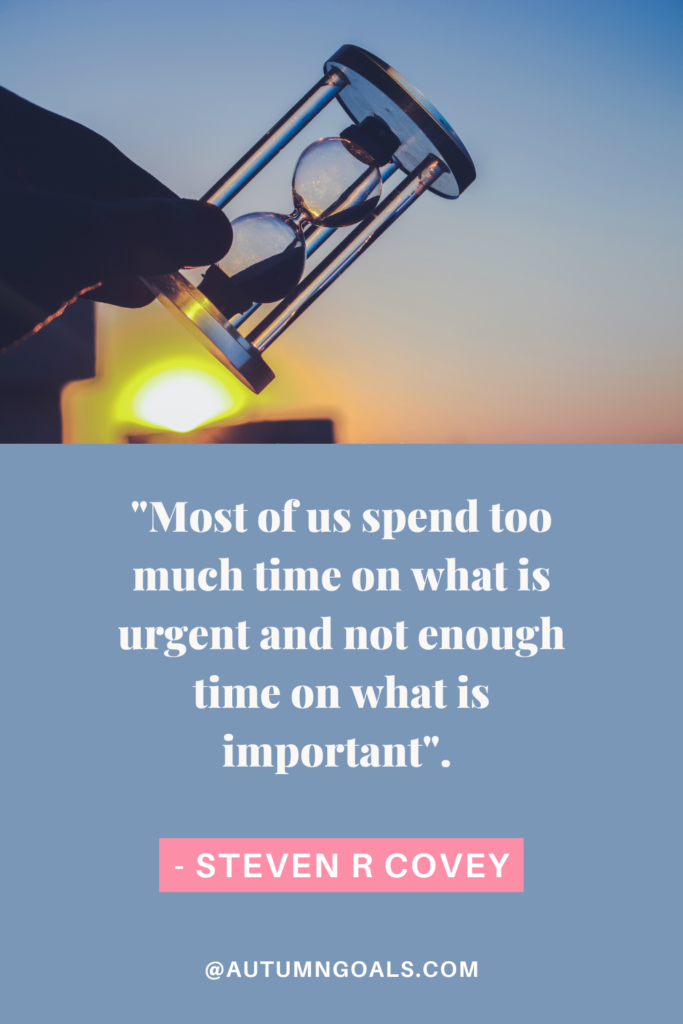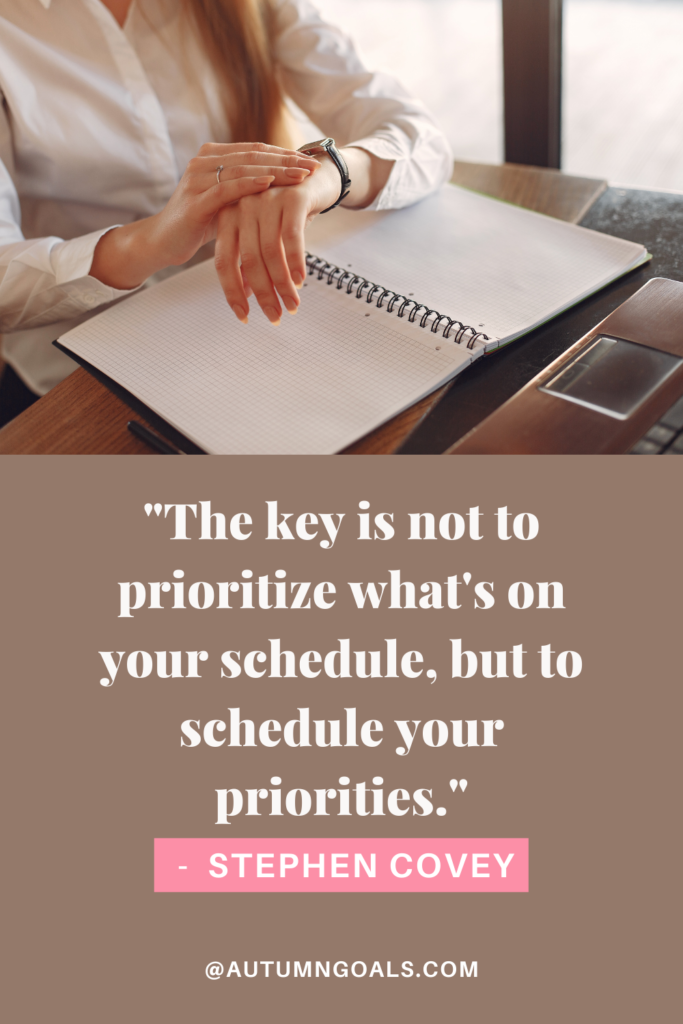The Power of Setting Personal Priorities
March 21, 2024 | by autumngoals.com

Photo by Michael Dziedzic on Unsplash
Setting Personal Priorities: Your Roadmap to Personal Development Success
In the journey of personal development, one crucial element often gets overlooked – setting personal priorities. Imagine your life as a vast canvas, ready to be painted with the colours of your dreams and aspirations. To create a masterpiece, you need a clear vision, a well-defined plan, and most importantly, a sense of prioritization.
In this comprehensive guide, we’ll delve into the art of setting personal priorities and explore its significance in your personal development journey. By the time you finish reading, you’ll not only understand why setting priorities is essential but also how to do it effectively.

The Foundation: Self-Discovery and Evaluation
Before you can set meaningful priorities, you must embark on a journey of self-discovery and evaluation. Here are the foundational steps to kickstart your prioritization process:
1. The Wheel of Life: Mapping Your Life Areas
Begin by visualizing your life through the lens of the Wheel of Life. This powerful exercise helps you identify key areas such as career, relationships, health, and more. Rate your satisfaction in each category to gain insights into where you stand.
Example: If you rate your career satisfaction low but your health satisfaction high, it’s a sign that your career may need more attention.
You can also refer to this post: Wheel of Life
2. Unveiling Your Personal Values
Your values are the compass that guides your life. Take the time to identify your core values, those principles that define who you are and what you stand for. Your values will play a pivotal role in setting your priorities.
Example: If “creativity” is a core value, prioritizing creative projects and pursuits will bring you fulfilment.
You can also refer to this post: Personal Values
3. The Master Dream List: Dream Big
Allow your imagination to run wild and create a Master Dream List. Envision your ideal life, and don’t hold back. This list will serve as a wellspring of inspiration for your future goals. Hopefully at the end of this exercise you will have 100+ dreams that you want to achieve.
Example: Dreaming of becoming a published author? Add it to your Master Dream List.
You can also refer to this post: Master Dream List
4. Crafting Your Mission Statement
A mission statement encapsulates your life’s purpose. It’s a concise declaration of your values, aspirations, and the legacy you want to leave behind. Craft your mission statement as a guiding light for your journey.
Example: “To inspire others through the power of storytelling and creativity.”
You can also refer to this post: Create a Mission Statement
5. Self-Evaluation: Assess Your Current State
Honest self-evaluation is a mirror that reflects your strengths and weaknesses. Identify areas where you excel and those that need improvement. This introspection is crucial for setting realistic priorities.
Example: Acknowledging a tendency to procrastinate in your self-evaluation can prompt you to prioritize time management.
You can also refer to this post: Self Awareness
The Art of Prioritization
With a solid foundation in self-discovery and evaluation, you’re now ready to master the art of prioritization. Here are the key principles to keep in mind:
1. Choosing the Top Priority: The Domino Effect
Consider this: Which one goal, if achieved, would make the biggest difference in your life right now? This is your top priority. Prioritizing it can trigger a cascade of positive changes.
Example: If improving your health is your top priority, achieving it might lead to increased energy, better relationships, and enhanced productivity.
2. Quick Wins Boost Confidence
Sometimes, tackling a smaller goal first can build your confidence and motivation. These “quick wins” create momentum for more significant challenges ahead.
Example: Cleaning and organizing your workspace can be a quick win that boosts productivity.
3. Categorizing Your Goals
Organize your goals by the areas of life they fall under, such as career, health, relationships, or personal growth. This categorization provides clarity and structure.
Example: Goals like “start a new fitness routine” and “network with industry professionals” belong to different life areas.
4. Breaking Down Big Dreams
If you have ambitious, long-term dreams, break them into smaller, manageable goals. This approach ensures steady progress and prevents overwhelm.
Example: If your dream is to start a successful business, break it down into tasks like market research, business plan, and product development.
5. Seasonal Priorities
Life is dynamic, and your priorities can shift with circumstances. It’s okay to allocate more time and energy to specific goals during different seasons of your life.
Example: During a busy work project, your career-related goals may take precedence over personal hobbies.
6. The Pyramid of Priorities
Once you’ve identified your priorities, arrange them in a pyramid shape, with the most important goal at the pinnacle and the least important at the bottom. This visual representation helps you focus on what truly matters.
Example: If family is your top priority, place it at the peak of your pyramid, and career advancement may come second.
7. Time-Smart Approaches
Consider the time you can realistically allocate to each goal. Find efficient ways to fulfil the requirements of each without compromising your overall balance.
Example: If daily two-hour workouts are impractical, opt for shorter, intense workouts or incorporate physical activity into your daily routine – perhaps use the stairs instead of the elevator.

The Benefits of Setting Clear Priorities
Now that you understand the process of setting personal priorities, let’s explore the myriad benefits it brings to your personal development journey:
1. Life Balance
Clear priorities act as the fulcrum of balance in your life. When you allocate time and energy according to your values, you create harmony between different life areas.
2. Effective Time Management
Prioritization is the cornerstone of effective time management. It helps you allocate your most valuable resource—time—toward your most meaningful goals.
3. Smart Financial Choices
Your financial priorities align with your life priorities. You’re more likely to make sound financial decisions when you know what truly matters to you.
4. Confident Decision-Making
Clear priorities serve as a compass in decision-making. You can confidently say “yes” to opportunities that align with your goals and “no” to distractions.
5. Stress Reduction
Knowing your priorities reduces stress. You’ll no longer feel torn between competing demands, as you’ll have a clear hierarchy of what deserves your attention.
6. Confidence Boost
Achieving your prioritized goals boosts your self-esteem and confidence. Each accomplishment reinforces your belief in your abilities.
7. Say No with Grace
Clarity about your priorities empowers you to decline requests that don’t align with your goals gracefully.

Your Roadmap to Personal Growth
Setting personal priorities is not just a task; it’s a lifelong skill that guides you toward your true potential. In the words of Stephen Covey, author of “The 7 Habits of Highly Effective People,” “The key is not to prioritize what’s on your schedule, but to schedule your priorities.”
Remember, your priorities are as unique as you are. By following the steps outlined in this guide, you’ll not only gain clarity about what truly matters to you but also create a roadmap for achieving your dreams.
In the grand symphony of life, setting personal priorities is your conductor’s baton, guiding the orchestra of your actions towards a harmonious and fulfilling existence. So, take the first step, and start prioritizing your way to personal development success today. Your future self will thank you for it.

RELATED POSTS
View all



